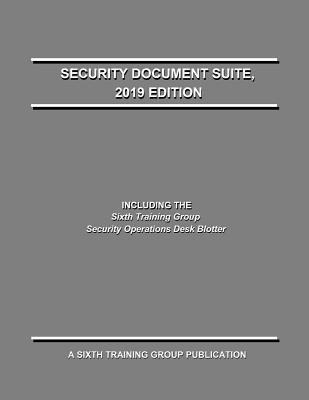

 Independently Published
Independently Published
Security Document Suite, 2019 Edition


Key Metrics
- Matthew Smith
- Independently Published
- Paperback
- 9781090585943
- 11.02 X 8.5 X 0.14 inches
- 0.43 pounds
- Political Science > General
- English
 Secure Transaction
Secure TransactionBook Description
In the operations of the current security industry, attempts to maximize profits have replaced ethical priorities. Instead of seeking security personnel who exemplify high standards of performance, the industry leadership has sought the lowest standard of performance in order to undercut competitors with similarly low standards, creating a downward race toward supposedly acceptable minimum. In the author's experience, the downward race has fallen significantly below an acceptable level, and the result is a web of unethical behavior from industry leadership which seeks to conceal performance failures.
In typical security operations, the requirement for a high quality written report in the aftermath of an emergency is presented to personnel which have received little or no training in writing reports. Current industry leadership does not hold personnel accountable to write high quality reports, and allows persons to continue in positions of responsibility even after proven inability to meet acceptable levels of performance in report writing. In a security operation which is lead in an ethical manner, the performance standard for written reports in emergency events will be built on a foundation of proven competence in writing routine reports. The acceptable standard for reports is clarity, accuracy, and completeness. When any type of emergency event occurs, and a high quality report is required, writing the report should be something the person has done before and does regularly. To remove this foundation, and to lower the expectations for routine reports, it to prepare personnel for failure.
It is the mission of Sixth Training Group to present an alternative to the ethical failures of the current security industry. To that end, the author has prepared a suite of standardized report forms, along with a standardized method of entering information, with many example entries included which may illustrate best practices for written reporting across a wide range of routine and emergency events. These report forms are designed for use with the standardized training requirements published by Sixth Training Group. A companion handbook is available which contains the example entries, and has an additional section devoted to reporting on incidents involving use of force.
If personnel leading security operations implement a standardized reporting system, and enforce standardized performance through challenging and relevant training, it will be possible to conduct operations at a high level of consistency.
During training, all simulations and field exercises should have a reporting requirement after the debriefing. Leaders should be on hand to provide guidance during the written reporting phase. The reporting system used during training, should be fully standardized with the system used during actual operations.
During actual operations, all personnel must be held to high performance standards for report writing, in order to provide all personnel with correct examples of reports during operations, which will reinforce the skills learned during training and provide a foundation for continuing high performance.
Author Bio
I joined the University of Strathclyde and the Centre for the Social History of Health and Healthcare (CSHHH) in 2011, after completing a PhD and post-doctoral work at the University of Exeter's Centre for Medical History. My research and teaching have focussed on three primary areas within the history of health and medicine: mental health and psychiatry; allergy and immunology; and food and nutrition.
Thanks to generous funding from the Wellcome Trust, this research has contributed to one edited volume: Proteins, Pathologies and Politics: Dietary Innovation and Disease from the Nineteenth Century (Bloomsbury, 2018, co-edited by David Gentilcore); and three monographs: An Alternative History of Hyperactivity: Food Additives and the Feingold Diet (Rutgers University Press, 2011); Hyperactive: The Controversial History of ADHD (Reaktion, 2012); and Another Person's Poison: A History of Food Allergy (Columbia University Press, 2015), which was reviewed in the New York Times and given honourable mention in the Association of American Publishers' Prose Awards for 2016.
I am currently working on a monograph project on the history of social psychiatry in the United States. Funded by an AHRC Early Career Fellowship, this project investigates how American psychiatrists and social scientists viewed the connection between mental illness and social deprivation during the decades that followed the Second World War. This funding has resulted in a special issue of Palgrave Communications (co-edited with Lucas Richert) and two edited volumes, Deinstitutionalisation and After: Post-War Psychiatry in the Western World (2016) and Preventing Mental Illness: Past, Present and Future (2018), both co-edited by Despo Kritsotaki and Vicky Long, and published in the Palgrave series I co-edit with Catharine Coleborne: Mental Health in Historical Perspective.
My social psychiatry project has spurred an interest in Universal Basic Income (UBI) as a preventive mental health policy. I am currently co-leading (with Mike Danton) a Scottish Universities Insight Initiative project called Peace of Mind: Exploring Universal Basic Income's Potential to Improve Mental Health.
In future, I would like to research the history of hydrotherapy in psychiatric practice.
I believe strongly that historical research can have a significant impact on public policy and decision making. As such, I have tried to engage with the public as much as I can through broadcasting, public lecturing, blogging and speaking to health and education professionals. My efforts in these areas were enhanced in 2012 when I was named an AHRC/BBC New Generation Thinker. I have written for medical publications, such as The Lancet and the Canadian Medical Association Journal (CMAJ), presented my research to the New York City Department of Health and Mental Hygiene and work closely with a range of medical and educational professionals. Recently, my book Hyperactive was used by novelist William Sutcliffe as inspiration and research for his novel Concentr8 (Bloomsbury, 2015).
I previously served as Vice-Dean of Research for the Faculty of Humanities and Social Sciences (HaSS), following stints as Co-Director of the Centre for the Social History of Health and Healthcare, the Director of Research for History and Deputy Head of the School of Humanities. I have also served on the Executive Committee of the Society for the Social History of Medicine and the Royal Society of Edinburgh's Young Academy of Scotland. I am a Fellow of the RSA and the Royal Historical Society.
Source: The University of Strathclyde
Videos


Community reviews
Write a ReviewNo Community reviews